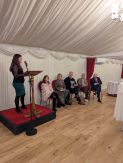
A new era for the nuclear industry?
Today the government announced a new approach to the Nuclear Sector, much of which the sector has been calling for over a long period of time. So does it truly herald a new era for the nuclear industry?
At Nuclear Week in Parliament only last week Paul Foster from Community Nuclear Power talked about the nuclear renaissance many have been referring to starting in 2004 and there’s no doubt that our new nuclear industry has suffered from a stop-start, change of government direction approach for decades. So do these announcements give us what we need to “build, build, build”?
Let’s have a look at what’s been announced:
- Reforms to planning rules, which currently only refer to traditional large scale nuclear power plants, to include SMRs.
- Reduction in red tape to enable building of more nuclear power plants in general with a release from the 8 sites which have historically been identified for new nuclear to a “sites away from built up areas” approach.
- Removal of the time limit on nuclear planning rules.
- Setting up a new Nuclear Regulatory Taskforce reporting to the Prime Minister and tasked with aligning regulations more with other countries and reducing the regulatory weight where it’s not necessary.
These are good news-many of them things the industry has called for over a long time. That doesn’t mean the job is done though. We still have an outstanding decision from Great British Nuclear on their technology competition, originally due to be announced this Spring but now with a vague “around July” being mentioned. This is an ideal opportunity to show that things have changed and decisions can be made at pace that seems to have been lost. There’s been no explanation on why there’s been a delay so none of us can say whether it’s warranted or not but, as I said, it’s a chance to show things are different which seems to have been lost.
A deeper part of the conversation about SMR’s is their variation & how different SMR designs can address different problems. I can foresee a world where communities define what their energy need is and the right SMR can be matched to that.
Speaking of communities, something which is close to our hearts here at BECBC. One of the barriers nuclear can often face is a lack of understanding, and therefore a fear of nuclear, in communities that haven’t previously hosted it. Communities that have hosted nuclear are positive and proactive about having more nuclear because they’re experienced the high paid, skilled jobs and wider social value it can provide. These communities are represented in the UK Nuclear Regions Collaboration and sent a strong message during Nuclear Week in Parliament that they, with their experience and knowledge, can not only welcome new nuclear development but also ensure it delivers wider regional economic development. Those communities have an ability to partner with developers to deliver more than a power station and prove to those communities that are less positive about nuclear that it can deliver for them.
So overall this is a very positive step forward by the government and is rightly being widely welcomed by industry leaders BUT we must keep the pressure on and make sure those changes deliver actual infrastructure. Nuclear power can provide energy security, support net zero and deliver economic benefit regionally. Let's get on and do it!
Image shows the panel at the UK Nuclear Regions Collaboration event in Nuclear Week in Parliament.

Log in to leave a comment